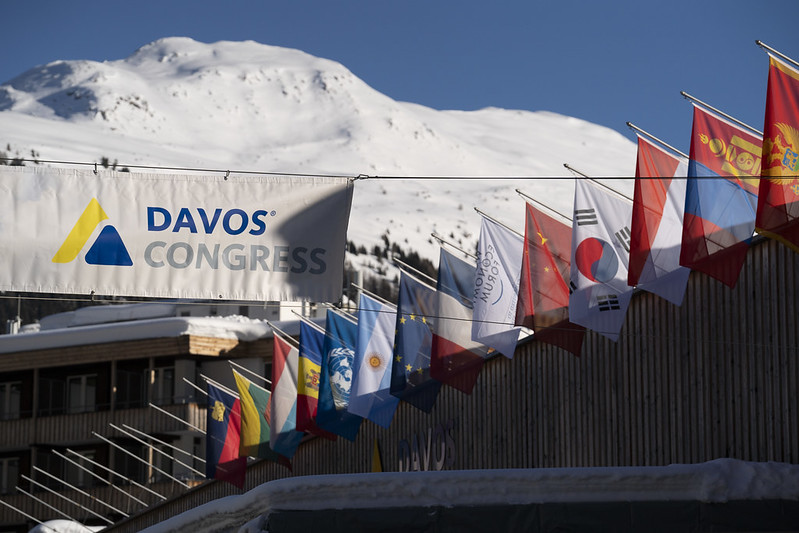Paul Holmes 22 Jan 2024 // 11:12AM GMT

One of the dominant themes of this year’s World Economic Forum meeting in Davos was the rising tide of populism and political polarization around the world, and the extent to which it troubles corporate leaders.
The Forum’s “Global Risks Report,” which is based on the responses of about 1,500 experts across academia, business, government, the international community and civil society, identifies that most serious dangers facing society—and therefore, businesses operating within that society—as (in order) misinformation and disinformation; extreme weather events; and societal polarization.
The fact that the next 12 months will see elections in the United States, the European Union, the United Kingdom, India and Indonesia, among others, only exacerbates the urgency of the situation, a fact underscored by a new survey of communications leaders around the world conducted by Page: 45% highlighted international conflicts and elections as the paramount critical risk demanding businesses’ attention in 2024, while 32% expressed concerns about polarization.
So one of the dominant narratives coming out of this year’s gathering in the Swiss Alps is that CEOs value stability and predictability, and are disturbed by the turmoil and uncertainty that accompany rising extremism.
Which makes sense.
But, as Politico reported this week, in a fascinating piece of post-Davos analysis, “Even as they long for moderate forces to rise above the extremes, there appears to be little sense of how the business community can help make that happen."
Which makes no sense at all.
I cannot speak to every election is every corner of the world, and obviously there are countries in which corporate influence on politics is more accepted and widespread than others, but I can certainly speak to the United States, where it can now be stated with relative certainty that there will be two candidates for president this year; Donald Trump and Joe Biden.
And here’s the thing: one of them is a populist and an extremist who three years ago attempted to violently overthrow the democratically elected government and who recently sent his lawyers out to argue that the President should have immunity if he decides to assassinate his political rivals. The other is a moderate—you can argue about whether he is more or less liberal than FDR or Obama, but he is very much part of a recognizably similar tradition—and after more than 50 years in various elected offices, the very definition of an institutionalist.
In other words, if corporate America really does value stability and predictability, there should be absolutely zero confusion about how to make that happen.
But you are still confused, consider the issues raised in the WEF’s Risk Report or by those quoted in the Politico piece. There is, for example, only one party in America that even acknowledges the number two item in the WEF survey, climate change; other issues cited by Davos attendees include “equitable access to health care” and Trump’s isolationist approach to trade.
And then, of course, there are the two issues that more than any others have defined political polarization—at least in as far as it impacts corporate America—over the past 12 months: ESG and DEI.
A year ago, pretty much every major corporation in America considered these two issues to be important, not because CEOs are “woke” (a nonsense idea, unless you have never met a CEO) because running a company that behaves responsibly and treats all customers and employees with respect is simply sound business. And to be fair, both DEI and sustainability were on the agenda at Davos this year.
And this, I suspect, is where the confusion lies. Not because corporate CEOs don’t know what to do to fight extremism, but because they are too cowardly to do what needs to be done.
The backlash against ESG and DEI has escalated over the past couple of years: first there was the attack on corporate free speech launched by the governor of Florida after Disney opposed attacks on the LGBTQ community; then there were the violent protests that followed efforts by Anheuser-Busch’s Bud Light brand to include all Americans in its marketing campaign; and the threat of physical violence against employees of Starbucks and Twitter and others that supported Pride month.
It’s not surprising that CEOs are reluctant to face the kind of social media outrage and threats of physical violence that are triggered these days by efforts to do the right thing.
But let’s not pretend that companies don’t know what to do in order to fight political extremism and polarization. Knowing what to do is obvious. It means directing campaign donations and corporate advocacy to the people who are trying to keep democracy alive. Actually doing that, however, may come at a price that most companies are reluctant to pay.
Public relations counselors might want to remind their bosses that a little short-term discomfort may be necessary if corporate CEOs want the kind of long-term stability and predictability the Davos crowd claims to care so much about.



































.jpg)

















